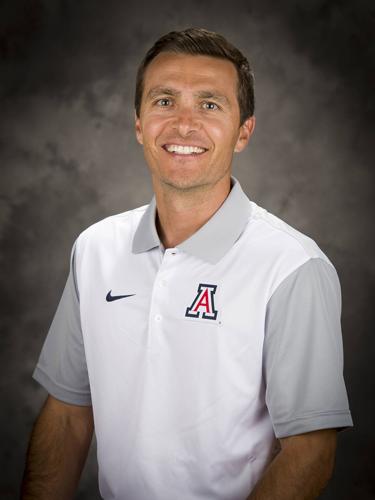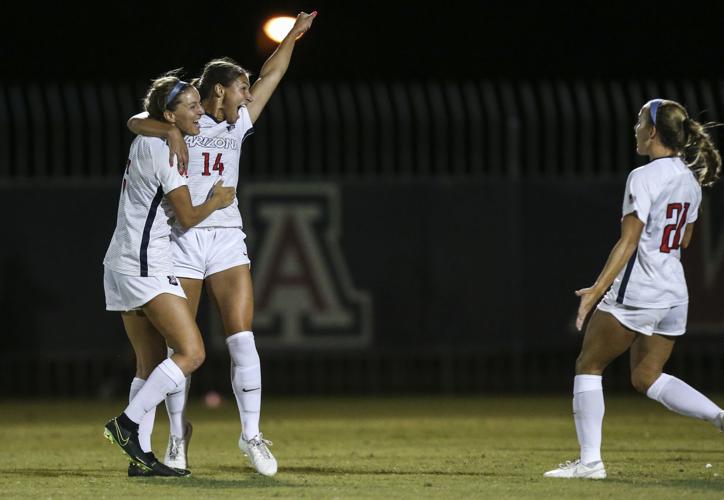Tony Amato has a good handle on his team and its capabilities. It’s one of the reasons why he’s been so successful as Arizona’s women’s soccer coach.
In a conference that includes powerhouse teams that compete for national championships year in and year out, Amato just wins.
Earlier this season, he picked up victory No. 200 in his 17-year coaching career at three schools. He long ago became the winningest coach in UA history.
Amato’s two most recent wins, however, stack up with some of his best at Arizona. The Wildcats beat then-No. 10 UCLA in Tucson on Oct. 3 , then traveled to Pullman, Washington, and topped then-No. 15 Washington State on Oct. 10. It’s the first time in program history that the Wildcats have beaten two top-15 teams in the same season, and just the second time in program history that they’ve topped UCLA.
After two weeks on the road, Arizona (8-4-1, 2-3-1 Pac-12) is back at home this week. The Wildcats will host Oregon (4-5-5, 0-4-2) on Thursday night, and take on Oregon State (9-3-2, 1-3-2) on Sunday afternoon.
The Star talked to Amato recently about his coaching philosophy, the key to winning in such a tough conference and what it looks and feels like when things are going as planned:
How did it feel to get to that number — 200 wins?
A: “I mean, honestly it wasn’t like this monumental thing — that I felt like, ‘Oh, this is the greatest thing I’ve ever accomplished.’ We’re just trying to win soccer games and put our players in a place to be successful and it just happened to be that I’ve been coaching enough years to get to 200. But it feels like I am just getting started. I am shocked I am 41 and been doing this since, I think my first head coaching job I was 26. So, it just feels like the years are flying by. And it felt more like that ‘Man, I am no longer a young coach, I’ve been coaching a while.’ I’m 41 — I feel young — but it’s not like I am the 26-year-old youngster coaching in college anymore. It just felt like I’ve been doing this a while and have accumulated some wins.”
How have you been so successful at Arizona in a conference that is so tough?
A: “It’s brutal; don’t remind me. We are in the middle of it. … I think it’s so many different things. You got to have good players to buy in to what you are doing. And our philosophy is a little different, so it definitely takes buy-in from the players in the sense that we are not traditional in everything we do. We are just trying to find a way to build off our players’ strengths and put them in a position to be successful. And I think that’s how we were able to win games with the same players that were already here when we got here. We didn’t view it as ‘we’ve got to wait and get our players in here. These players aren’t good enough and we got to get rid of them.’
“We looked at it as, how can these players be successful? We know we’ve got to overcome some obstacles. We have to think outside the box. We can’t do what everyone else is doing, because they had a head start on it. It’s how can we put these players in the best position to win soccer games and maximize their potential? And we just focused on their strengths. How do we do that? What can they do? And ask them to do that. A lot of times coaches have a set formation, a set style of play. This is what we are going to do, no matter what. And that is not what our approach was when we got here. And that takes a lot of buy-in from the players each and every year. Because it’s totally different from what they are used to in club or high school.”
Your scheme changes every year depending on the skill set of your players. At some point, do you want a scheme that is more set with just minor tweaks each year?
A: “I think this is what we have to do to be successful in our program at Arizona. Stanford has the ability to — day in and day out — to do what they want to do. I think for us to compete in the Pac-12 against teams like Stanford — our goal is to win against the best teams in the country — for us at Arizona to be able to do that, every week we have to be able to scout the other team, game-plan, and have our players do what they can do against that team to be successful. So, where we are with that now is exactly the same as it was in 2013; it’s just different players and different schemes and that means even as a coaching staff we are learning every week. I mean we’ll scout the other team and (say), ‘we haven’t done this before in some instances, but I think with this team we can do this. This is what they do, here’s how we are going to stop that and here’s how we are going to attack it. And we are going to create goals and prevent goals. How are we going to do that?’
“We just kind of look at it as what do we want to take away that they are doing? And what do we want to expose? Like how do we create goal-scoring chances? And how are we going to win the game?”
It’s a lot of work for the student-athletic to make these changes every week. Do you recruit players with high soccer IQs who have that ability to adapt?
A: “For the most part, because the Pac-12 is so athletic, we have to recruit athletic players — and it really starts there. And then we figure out where is their soccer IQ. Because you can’t have great soccer IQ and no athleticism in the Pac, it does not work. So we usually start with recruiting really athletic players who can play soccer and then you figure out what there IQ is and how do you make that work with the players you have. And some soccer IQs are off the chart and some are not there, but they are super athletes. … We just put it all together and find ways to win games.”
You have had two big upsets so far in UCLA and WSU. What was clicking in those matchups?
A: “When it’s worked — you brought up those two upsets — we’ve gotten the game plan right and the players bought into it and they carried it out. So, against UCLA was a very different game plan than against Washington State. Two completely different situations and I felt like in both of those situations we got it right and they carried it out to a T. And when we have not won, one of those has been off. … We got it right and the players carried it out.”
Do you feel it when it’s all working? During the UCLA match, did you feel like it was happening just the way you planned it?
A: “Basically, what I have in my mind is that I want the game to look this way. If we’re going to win, it needs to play out like this. As the game is going on, I can see, yes, it’s playing out how I want it to. Now, it’s still nil-nil or we’re down 1-nil, but this is how I want the game to look. That’s what I keep saying to myself: ‘Is this how I want the game to look? Yes? OK, let’s keep doing this, do this, do this, do this.’ Based on how it looks. There are other times, ‘This is how I want it to look and it does not look like that. Why? Did the other team do something different? Or are we not doing something?’ So that was the difference between Thursday (against Washington State) and Sunday (against Washington, a 3-2 loss in overtime). On Thursday, it looked how I thought it would look based on the conditions and the other team. … On Sunday, within 10 minutes I was like it’s not looking how I want it to look. It was like, can we adjust? Can we fix it? … At halftime, our talk with the team was, ‘We either have to fix this or we need to go to Plan B. What do you want to do?’ And they said Plan B. … It’s an accumulation of not being focused, dialed in on the right things on the fifth day on the road. And you are not going to win against Pac-12 teams when that happens.”
What can you do as coaches to overcome that?
A: “You have to be aware of it, which we were, which we are. And you got to give the players specific objectives to stay focused during the game. … If you can find a way to give them some rest during the game, bring them out and let them wander off in those few minutes — that’s when you can wander off. But then you have to get them dialed in and get them back in the game. Where we struggled was, we didn’t get those players some rest and that ended up hurting us late.”
Is there a vibe you get when the game plan is working? Are the players dialed in even more?
A: “Yes, you can see it, feel it, hear it. They are on the front foot of everything they do, if that makes sense. If they don’t have the ball, they are already moving to win it back — and if we have the ball, they are already in motion to make things happen. It’s not late —I call it late — in their role in that moment. When they are late, it’s like they are tired or they are not seeing it, not bought-in. Something is off. Sometimes I ask them, ‘Are your legs heavy? Because we look late. Are we unsure? Are we not confident? Does it not look like you thought it would look?’ There are times when I’m talking to players on the sidelines, subbing players or asking them at halftime break. I need to know because if it’s (just) heavy legs, I can sub out for that.”
How do you motivate your team after a tough loss?
A: “It’s usually way easier after a loss. It’s when you are winning a bunch in a row that we get concerned about — are they getting comfortable? Losing, it’s usually easier to get dialed back in to win the next game. … We respond to challenges. It’s harder when we just won five straight and we just beat UCLA. Just look, we beat UCLA, we lost to USC. We beat Washington State, we lost to Washington. It’s harder after those big wins. I don’t worry about their motivation to compete. It’s a matter of do we execute and find a way to win.”





